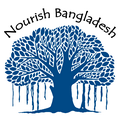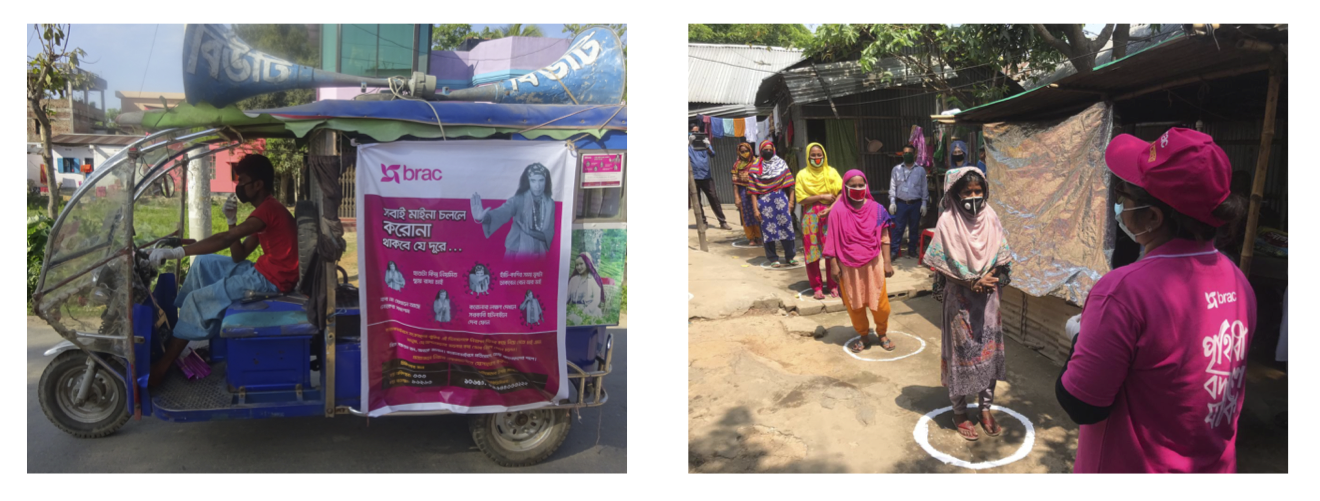BRAC USA
All donations made to Nourish Bangladesh by US residents are tax deductible since Nourish Bangladesh is an IRS approved 501(c)(3) organization. US donors may also donate to Nourish Bangladesh via Zelle at nourishbangladesh.us@gmail.com
Who is BRAC USA?
BRAC is an NGO based in Dhaka, Bangladesh whose mission is to empower people and communities in situations of poverty, illiteracy, disease and social injustice. BRAC started in 1972 as a microfinance institution, and since then has spread throughout the world with multiple projects including direct cash and food transfer projects for the ultra poor, employment assistance, public health endeavors, and joint-programs, such as their popular joint-program with GrameenPhone known as Dakche Amar Desh. While BRAC’s work is varied, the underlying methodology is that they pilot, perfect, and scale all of their projects to ensure efficacy. BRAC is currently prioritizing Covid-19 relief through a food assistance fund and a public health campaign aimed at informing the Bangladeshi public, reducing spread, and preventing death.
Highlights
BRAC is a long-established NGO, well known within Bangladesh and internationally and regularly vetted by assessment organizations. They are able to specifically use donations for Covid-19 relief efforts in all 64 districts of Bangladesh. In addition to focusing on women and girls, they are also notable for serving minority and especially underserved communities, including Rohingya refugees, sex workers, LGBTQ, and the transgender community.
Responses to Vetting Questions
These responses are based on our correspondences with Ms. Ashley M Toombs, Director of External Affairs at BRAC USA, and our independent research of information available on their official website. In particular, we focus on BRAC USA's general activities and their plans for using the funds donated through our fundraising campaign. We researched and asked the same set of standard questions to the other NGOs we vetted as well.
Question: With our donation, what is the geographical spread of the relief recipient (e.g. Dhaka city, rural Mymensingh, etc.)?
Response: BRAC is working on Covid-19 relief efforts across all 64 districts of Bangladesh and your funds would cover our work in all areas.
Question: With our donation, which groups will be helped (e.g. LGBTQ community, Transgender community, street children, Garo indigenous population, sex workers, gypsy community)?
Response: We are applying comprehensive Covid-19 response efforts across the most vulnerable communities in Bangladesh, in both rural and urban areas, with a particular focus on women and girls. In addition, we have designed specialized interventions for other populations that are often the most marginalized including, but not limited to, transgender, LGBTQ, and sex worker communities.
Question: With our donation, will you reach out to the Rohingyas?
Response: Yes, we have a comprehensive Covid-19 program in place for the Rohingya camps in Cox's Bazar, as well as the surrounding host communities. We currently have over 2,300 staff on the ground responding and our need for support is increasing daily as the number of Covid-19 cases in the camps continues to increase.
Question: Can you give us a price breakdown of how much money is spent towards food relief (e.g. with 1000 taka we offer lentils, rice, onions, and potato for a family of 4 for two weeks) or how much cash is handed to each household (e.g. 1800 taka for each adult in a household)?
Response: We are unable to provide an exact price breakdown of how much money is spent towards food relief, as we provide varying content for different contexts such as families living in rural versus urban areas. In BRAC's initial Covid-19 response, the organization was able to provide an average of two weeks worth of food for a family of four people for $18 USD.
Question: We prefer our donations be used for cash transfers or food relief. Nonetheless, what type of other services, if any, other than food relief or cash transfer will be provided with our donations?
Response: Given the breadth of its work, BRAC cannot guarantee that your donation will be used exclusively for food relief or cash transfers. BRAC is also working on other services, such as providing Cyclone Amphan relief, house repairs, WASH facility repairs, and multipurpose cash support.
Question: Can you ensure our donation money is spent only on food relief or cash transfer? If not, can you provide a list of services our fund will be used for?
Response: No, we cannot. However, BRAC is also providing ongoing healthcare services for both Covid and non-Covid-challenges, supporting health institutions to meet the demand for equipment, modifying education programs and curriculum to continue reaching the children and adolescents who are no longer able to attend school physically, and conducting ongoing awareness and hygiene campaigns.
Question: Are you able to customize your food relief or cash transfer efforts based on what we want the donation to be used for?
Response: No, we are not.
Question: Do you have any mechanism to ensure transparency of exactly where our money is going?
Response: There is a weekly Situation Reports on our Covid-19 efforts in Cox’s Bazar and in Bangladesh more broadly (https://www.brac.net/covid19/index-en.html). In addition, the progress being made towards BRAC’s Covid-19 fundraising goal in Bangladesh can be tracked here: https://www.brac.net/covid19/en/donate/.
Question: Can you give us an estimate of what percentage of our donation is used up in overhead cost i.e. if we donate 1000 USD, what fraction of that will go directly to the poor?
Response: The average overhead on funds that have been sent to BRAC entities via BRAC USA is 5.6% (past three audited fiscal years). Note that this does not include other costs associated with relief distribution (e.g. transportation cost) once it reaches Bangladesh.
Question: Is your organization secular or religiously-affiliated? Does this affect who you serve?
Response: No. BRAC does not affiliate itself with any religion or political parties. Our priority is to serve the most vulnerable populations in all communities across Bangladesh.
Question: Can you give us a very brief history of your relevant past efforts that makes you uniquely suited to carry out relief efforts in the face of Covid-19?
Response: BRAC is well-positioned to coordinate effective responses to the outbreak, having deep experience in humanitarian response. we work alongside governments, non-governmental organizations, and communities to build disaster resilience and respond holistically to the effects of both natural and man-made disasters and epidemics. BRAC has immediate avenues for outreach through our network of community health workers, microfinance loan groups, youth empowerment clubs, schools, and other community programming. Though these programs are limited during the outbreak, we are leveraging our existing relationships with beneficiaries, local leaders, partner organizations, and governments to ensure a coordinated response.
Question: Do you have any mechanism in place to ensure that you are aware of which households are getting help from the government, so as to avoid overlapping coverage with government efforts?
Response: BRAC is working closely with the Government of Bangladesh and other implementing partners to increase transparency and digitization efforts to avoid overlapping coverage and allocation of resources. The organization has increased its use of mobile money platforms for the allocation of cash transfers to ensure funds are able to reach the intended people with speed and efficiency.
Question: Do you have any results from non-profit assessment organizations (i.e. Givewell)?
Response: For the past five years, BRAC has been named the world’s #1 NGO by Geneva-based NGO Advisors for its impact, innovation, and sustainability (https://www.ngoadvisor.net/ong/brac). BRAC’s work has been awarded and recognized on numerous occasions including the Yidan Prize in 2019, Lego Prize in 2018, Laudato Si’ Award in 2017, World Food Prize in 2015, WISE Prize for Education in 2011, Hilton Humanitarian Award in 2008, and Gates Award for Global Health in 2004. For a more comprehensive list, please see the following: https://www.brac.net/recognition.


